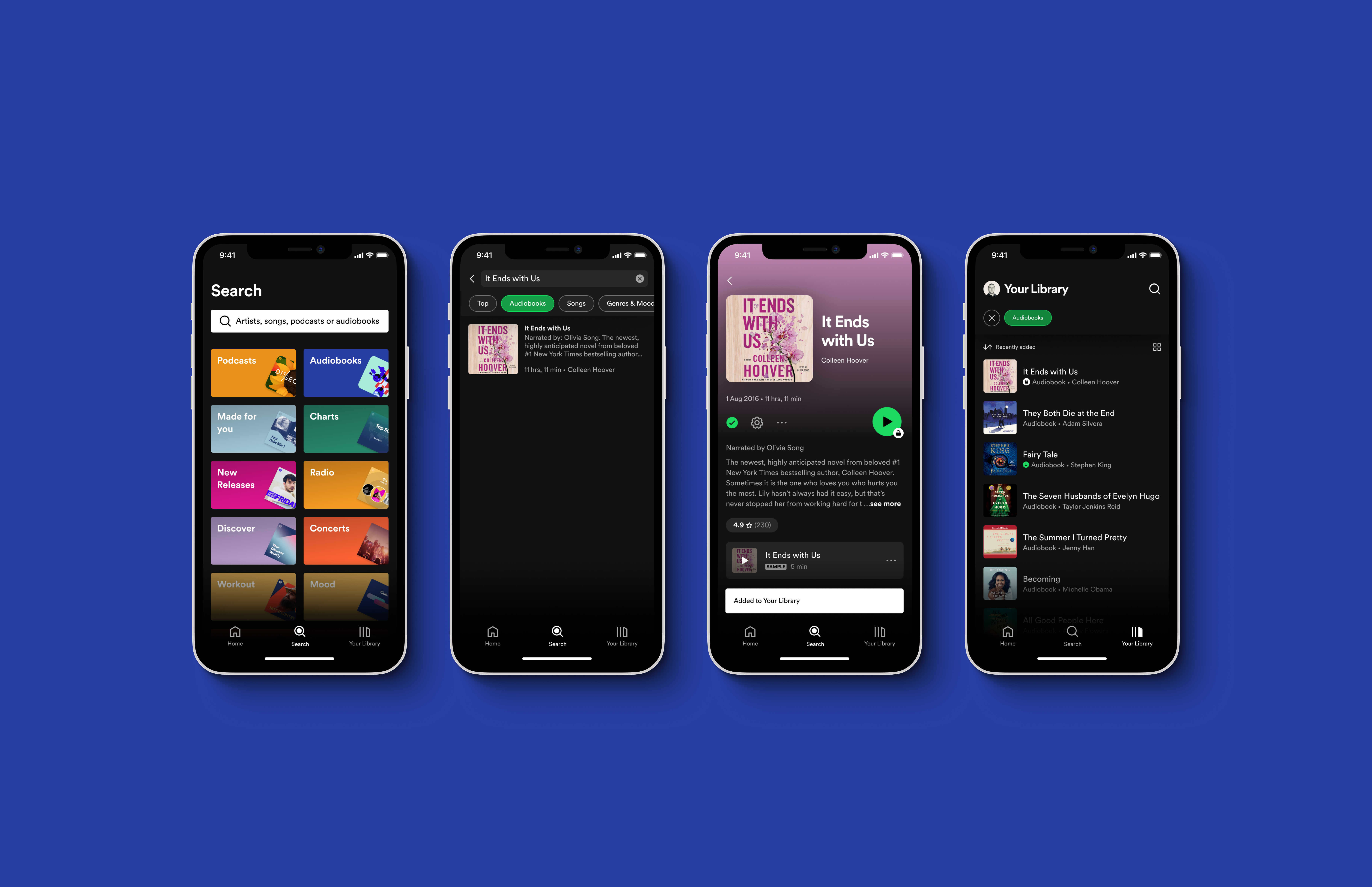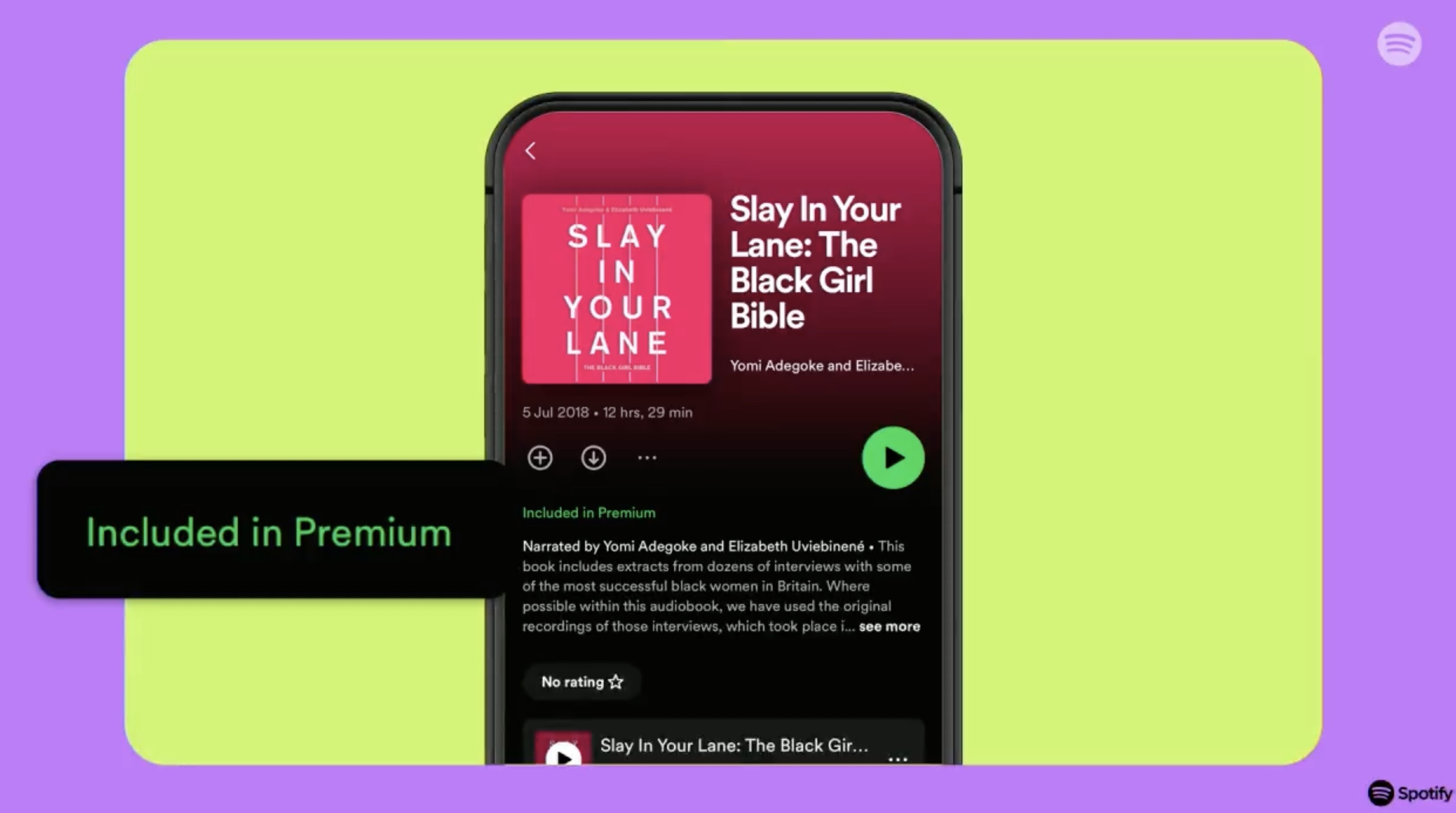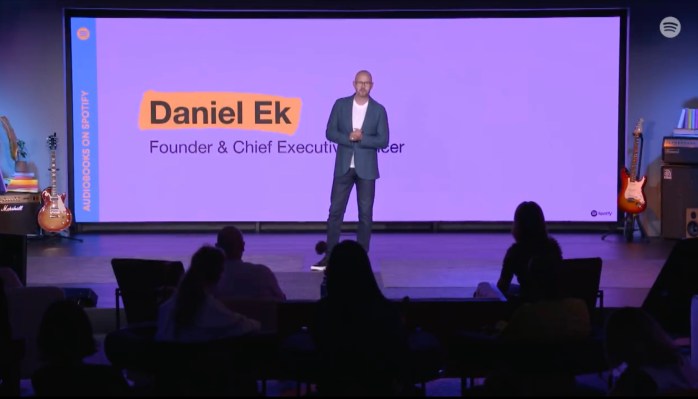Spotify today unveiled what’s next for the future of its audiobooks service. At an event hosted in its New York offices on Tuesday afternoon, the company announced a new business model where it will now provide Spotify Premium subscribers with access to a subset of its audiobooks catalog — a total of 150,000 titles — without an additional charge.
The service will initially launch in the U.K. and Australia starting today and will launch in the U.S. later this year, with more markets to follow.
“Audiobooks today have one big dominating player. And just like in music and podcasting, we believe that many more consumers want to consume audiobooks and want to listen to audiobooks,” said Spotify founder and CEO Daniel Ek, speaking at the event. “And just like in music and podcasting, we’re really excited to be able to bring all the amazing tools that we built for creators and consumers alike to enable more discovery of these amazing audiobooks to the entire world,” he added.
Powered by its acquisition of the digital audiobook distributor Findaway, Spotify first launched audiobooks in the U.S. in September 2022, with a catalog of 300,000 titles to start before expanding to other English-speaking markets later in the year and Canada in early 2023. At the service’s debut last year, Spotify touted the company’s potential to tap into a growing market, noting that audiobooks were just a 6% to 7% share of the wider book market, but the category was growing by 20% year-over-year.

Image Credits: Spotify
However, using Spotify’s service has not been as seamless as it could be for consumers because the company attempted to work around the app stores’ rules regarding in-app purchases by requiring users to buy audiobooks from the Spotify website in order to play them in its app. Plus, Spotify couldn’t direct customers to the website because of the app stores’ “anti-steering” rules, which prevent app developers from pointing to alternative means of paying outside of the app stores’ own payment mechanisms.
With access to audiobooks as part of the Premium service, listening to the books will become easier for end users.

Image Credits: Spotify
Ek noted that this change will help the company by increasing user engagement with Spotify as well as reducing churn. In addition, he said it gives “great flexibility to our business which will then ultimately help our revenue and profit.”
The company also suggested that the audiobooks market today has a distribution and discovery problem, which Spotify aims to solve the way it’s done for music and podcasts.
“Tens of millions of Premium subscribers are already interested in listening to audiobooks,” said Spotify co-president and chief business officer Alex Norström. “They just need the opportunity.”
He also noted that estimates indicate that 2 billion people will read a book this year, but the audiobook slice of that pie remains small.

Image Credits: Spotify
Though Spotify’s broader audiobooks catalog launched with 300,000 titles, only half of those are available through the Premium subscription. While subscribers can read as many books as they want, the service will be time-limited to 15 hours per month. But users will be able to buy more time by purchasing an additional 10 hours as a “top-off.”
Alongside the launch, Spotify will provide editorial recommendations of books to users as well as personalized suggestions based on users’ tastes.
“We’re going to feature editorial recommendations, curated by a diverse team of experts. And these will appear in the audiobooks hub,” explained Spotify VP, Head of Audiobooks Business, David Kaefer. This hub will include feature shelves that highlight popular genres as well.

Image Credits: Spotify
“We’re also going to make recommendations guided by a streamlined taste onboarding,” he continued. “This is something that every listener is going to get as soon as they access their application. And it’s going to prompt users to choose some of their favorite titles and some of their favorite genres. That’s how we’re going to begin to learn how we’re going to begin to suggest the right titles to each listener,” Kaefer added.
He said tests to personalize audiobook recommendations were already underway and those will also appear in the app’s Home feed, which will put them in front of tens of millions of people daily.
Authors, meanwhile, will gain access to new tools, like promo cards they can customize with visuals, that they can use to capture users’ attention. Later, Spotify will be working on more advanced tools that will allow authors to understand how their titles are performing.
As the feature rolls out to supported markets, the available audiobooks that are included with the Premium offering will have a flag next to them so subscribers will know they can stream the book without a charge.
Users will also be able to share their favorite audiobooks on social media with built-in sharing tools and will be able to curate audiobook playlists.
“We’ve got instant access. We’ve got discovery. We’ve got front-and-center placement, easy social amplification, and dedicated tools,” Kaefer concluded. “And all of these things are going to help increase the number of people listening to audiobooks and help listeners engage with the format with less friction,” he said.
